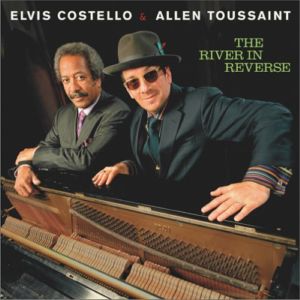
- Format: MP3

It's impossible to consider The River in Reverse without taking the devastation Hurricane Katrina wreaked upon New Orleans into account. Indeed, it's quite likely that this collaboration between Elvis Costello and Allen Toussaint would not even have occurred if it weren't for that cataclysmic event. They've collaborated before — Toussaint wrote horn charts for Costello's 1989 album Spike — but neither had plans to work together until they appeared together at several benefit concerts for the victims of Katrina in September of 2005. That kick-started the album that became The River in Reverse. Initially, the plan was for the collaboration to be a songbook album, with Costello and Toussaint performing some highlights from Allen's rich songbook, and while the record bears some remnants of that blueprint — seven of its 13 songs were written by Toussaint in the '60s and '70s — the finished work evolved into an elegant, eloquent protest album crafted out of old songs and new. Costello alone wrote the title track, premiering at a benefit concert at Town Hall that September, and its angry account of the flood that wrecked New Orleans provides a touchstone for the other five new songs here, all co-written with Toussaint. "Broken Promise Land," "Ascension Day," and "International Echo" explore the aftermath of Katrina, while "Six-Fingered Man" is a funny acerbic take on a sinful sloth who is "always the first to blow his horn/His achievements multiply/Pity half of them seem to be lies." Toussaint's presence on these five songs tempers but doesn't dilute the churning anger that roils underneath The River in Reverse: "Broken Promise Land" drives along on a swampy funk rhythm, the spare and laid-back "Ascension Day" is a showcase for Allen's piano, "International Echo" revives the rolling spirit of classic New Orleans R&B, while "Six Finger Man" has a grinding, gritty blues backbeat. All five of these new songs are genuine collaborations, bearing the unmistakable stamp of both highly distinctive musicians, but the best compliment that can be paid to them is that they blend seamlessly with the classic Toussaint songs that comprise the rest of the record. When placed next to explicit songs of protest like "Broken Promise Land," such New Orleans R&B and soul staples as "On Your Way Down," "Tears, Tears and More Tears," "Freedom for the Stallion," and especially "Who's Gonna Help Brother Get Further" with its chorus of "What happen to the Liberty Bell, I heard so much about?/Did it really ding-dong?/It must have dinged wrong/It didn't ding long" take on an entirely different, politically charged meaning.
This undercurrent of protest gives The River in Reverse thematic cohesion — and as politically minded pop goes, it trumps such other 2006 albums as Neil Young's Living with War, if only because it isn't so heavy-handed about its intentions — but what makes the album rather extraordinary is that it's as much celebration as it is protest. There is joy and tenderness within the performances of Toussaint, Costello, his backing band the Imposters, and Toussaint mainstays the Crescent City Horns, all captured by Joe Henry's clean yet warm production. If Costello pushes his phrasing a little harder than most interpreters of Toussaint — not only does Allen himself have an easy, casual delivery, but so did such singers as Lee Dorsey, Aaron Neville, Ernie K-Doe, and Lowell George — it suits the spirit of when the album was recorded, and Elvis is balanced about by the earthy, natural sound of the band, and Allen's graceful harmonies. As pure music, this is impossible not to enjoy, and this rich blend of R&B, blues, soul, and funk illustrates exactly how important New Orleans is to America's culture, and that it needs to be embraced in the wake of the disaster of Hurricane Katrina. Ultimately, the greatest achievement of The River in Reverse is that it, like the music of New Orleans itself, can not be pigeonholed or reduced to one specific thing. It can seem like a party, or it can seem like a bittersweet elegy, which is only appropriate for an album borne out of tragedy but created as a celebration.